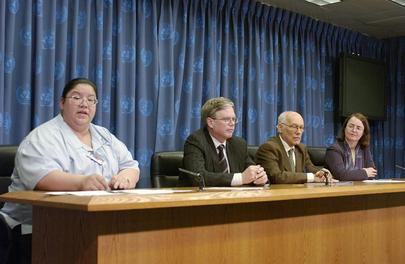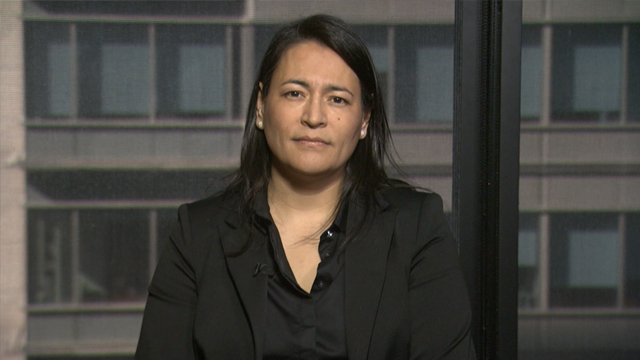Kenneth Jackson
APTN National News
OTTAWA – Soon after Stephen Harper began his first term as prime minister in 2006 he set out to cut $1 billion in funding across the board and one of the hardest hit departments was Status of Women.
Satellite offices were closed across the country and funding was cut nearly in half.
That was on the surface.
Behind the scenes, Harper also wanted to cut funding to the Native Women’s Association of Canada that paid for its Sisters in Spirit program that was, for the first time in history, officially tallying the number of missing and murdered Indigenous women.
“(Harper) was trying, but we fought back. I told them I wouldn’t do that and I’d go public,” said former NWAC president Beverley Jacobs. “I would have sued Canada for breach of contract. I had an awesome women legal team at that time.”
The money the government was after was the $5 million, spread out over five years, to fund the research into Sisters in Spirit first announced by the Liberal government under prime minister Paul Martin in 2005.
It was written in a contract.
The Harper government backed off, but they weren’t done.
Harper put NWAC in a proverbial chokehold – described as a slow and meticulous “death” that has left NWAC a shell of its former self today where staff “wait for the axe to drop” at any moment.
And during Harper’s time in office almost 300 Indigenous women have been found murdered, died under suspicious circumstances or went missing according to data collected for APTN, as of May 2015, by well known researcher Maryanne Pearce.
This while calls ring out across the country for a national inquiry that Harper says isn’t needed.
This story is just as much a timeline of the events since 2005 as it as a narrative of Harper’s policy on missing and murdered Indigenous women as he seeks to become the longest serving prime minister in history on Oct. 19.
SISTERS IN SPIRIT – $5 million
Sherry Lewis was the executive director of NWAC from 2003 to 2007.
In May of 2005, the Liberal government came to NWAC with a proposal to fund a five-year program to look into missing and murdered Indigenous women – what would be called Sisters in Spirit.
Lewis said NWAC was at the United Nations’ Permanent Forum on Indigenous Issues in New York on May 23, 2005 when she was approached by Fred Caron, then assistant deputy minister, of then, Indian and Northern Affairs Canada.
Caron offered NWAC $5 million over five years and part of the deal was NWAC had to take part in a press conference at the UN meetings.
The deal was approved by Beverley Jacobs and NWAC’s board of directors.
“It rolled out from there. We negotiated what that was all about,” said Lewis. “At the time, we ensured the ownership of the name, brand, everything belonged to NWAC.”

Lewis said NWAC also enjoyed a “positive relationship” with the Liberal government. Frequently, staff was invited to take part in special gatherings, meet foreign dignitaries and the government would promote the organization.
When the Harper government took control, it was like “night and day” said Lewis.
“There was a lot of that stuff going on (under the Liberals). It kept us busy all the time,” she said. “When the Conservatives came in it was like a door slammed shut.”
Lewis said the invitations to meet dignitaries no longer arrived and NWAC was in the dark.
“They gave us minimally what was required under Sisters in Spirit,” she said.
As Sisters in Spirit was in full swing the Harper government demanded documents on everything – every call from media, every trip taken, any and everything said former executive director Kate Rexe, who joined NWAC in April of 2009.
Annual reports to Status of Women were binders four inches thick documenting their every move.
“When I requested to only submit a 25-page report (because of the intense scrutiny and time it took to compile the report) they insisted that wasn’t enough and wanted everything we had done including numbers, media interviews, meetings, articles, presentations,” said Rexe. “Mainly, because I don’t think anyone believed we were actually doing what we said we would do: report the number of missing and murdered Aboriginal women and girls in Canada.”

Rexe believes there’s only one reason for this after their first report in 2009 detailing stories from families of missing and murdered women started to get media attention. Rexe, herself, spoke to the media a number of times to push the message.
One time she said her comments enraged former Status of Women minister Helena Guergis who called NWAC’s office trying to get her fired.
“As much as Minister Guergis may not have liked me (or) NWAC pushing the government or the attention in the media, I think she was the scapegoat for cabinet. It is my belief that she was pushing hard to have the work of SIS continue and the (Prime Minister’s Office) didn’t want to see it go any further,” said Rexe.
APTN reached out to Guergis, through her lawyer, but never heard back.
With funding to the SIS program scheduled to end in March 2010, NWAC released its second report saying there was 582 Indigenous women in Canada who were missing or had been murdered since the 1980s. They gathered most of the data from newspaper articles online and from families themselves.
That’s when Harper made his next move.
Every time NWAC submitted funding proposals to Status of Women any reference to Sisters in Spirit was scratched out or came with a clear message – that program no longer existed once the funding ran out. The name couldn’t even be used, said Rexe.
NWAC was at crossroads. They had all this data – but was hitting another wall with the Harper government.
That’s when Rexe left.
She felt her name had become synonymous with NWAC and maybe it was doing more harm than good.
“I was really worried I was going to become a hindrance to NWAC and Sisters in Spirit in moving forward if my name was attached to funding proposals,” she said, adding she was the ninth executive director of the program to leave since it began in 2005 – most due to stress.
The pain of working with families and trying to help them only to be thwarted by the Harper government became too much for many at NWAC said Rexe.
EVIDENCE TO ACTION – $1.89 million
With funding for Sisters in Spirit coming to an end, NWAC had to come up with a different program, and they did. It was called Evidence to Action. The new three-year project would receive $1.89 million in funding from Status of Women beginning in February 2011. One of the conditions of this new money was that NWAC could no longer conduct any research into missing and murdered Indigenous women.
Despite strict rules prohibiting research, APTN was told NWAC quietly kept updating its database. A volunteer was pulling names from media articles.

Michele Audette began her term as the outspoken president of NWAC during this time and almost immediately the RCMP came to her looking to access the database, which they hadn’t shared with anyone always citing privacy.
It wasn’t the first time the RCMP had tried to peek inside the database.
Mounties had been working on a memorandum of understanding with previous president Jeannette Corbiere Lavell, who replaced Jacobs, but the board didn’t want her to share the database said Audette.
“That first week, August 2012, the RCMP asked me if we could work together on the MOU. I said ‘No. I’ll be here for the next few years and we should go further than the database,’” said Audette.
A few months passed and the RCMP national headquarter’s spokeswoman Cpl. Julie Gagnon went public in February 2013 and “discredited” NWAC’s numbers of MMIW by saying the RCMP only knew of a few dozen names of MMIW said Audette.
“Then boom. There that’s that Julie,” said Audette. “Whacking NWAC’s work and credibility.”
The concerning part, for NWAC and Rexe, was the RCMP wasn’t being completely honest.
The way Rexe explains it is she went to the RCMP in early 2010 with the 118 names of women they weren’t sure were Aboriginal and asked if the Mounties would confirm.
They came back with 64 confirmed cases of Indigenous women but they knew it was only a portion of NWAC’s database.
“I was furious,” said Rexe. “I thought you have completely taken that out of context.”
Audette was furious, too.
But, instead of fighting in the media, she “extended a hand” to Supt. Tyler Bates, who was then running the RCMP’s Aboriginal policing unit.
They spoke a couple times on the phone, she said, and Bates offered to write every police force in Canada asking for their statistics on MMIW.
From that point on NWAC and the RCMP had a working relationship, but Audette still wouldn’t hand over the database.
Over the next year they would meet and discuss how the RCMP’s project into tallying the number of MMIW from 1982 to 2012 was going. Each time, the RCMP would inquire about the database, according to Audette and other sources.
On Feb. 20, 2014, NWAC met with the RCMP again. Bates was supposed to be at the meeting but was called away.
Other members of the RCMP at that meeting told NWAC they were 98 per cent done, the number of MMIW was over 1,000 and they just needed NWAC’s database to wrap it up.
That’s when NWAC provided the database, but none of the personal statements from family members of victims, said Audette.
APTN reported on April 30, 2014 that the number was over 1,000 and was supposed to be released on March 31 but the report’s release was being stalled by Public Safety Canada.
APTN spoke to Bates before publishing and he said the report would come out “down the road.” About two weeks later the RCMP’s report was released in Winnipeg, away from the Ottawa spotlight, and Public Safety refused to answer questions on whether they stalled its released for March 31. The project found 1,181 MMIW cases between 1982 and 2012 with the help of every police force across the country pulling files.
The RCMP denied any interference by Public Safety.
“I was shocked that they did release the report because it was putting a bad reputation on the Conservative government,” said Audette. “Was it something that leaked and they no choice but to release it? I think we have an angel on our side.”
The March 31 date is potentially important because on March 6 the government released its parliamentary report on violence against Aboriginal women. That report consisted of months of testimony from experts, families and government officials.
A draft report of that committee’s findings called for a national inquiry into MMIW but when the final version was released that recommendation was nowhere to be found.
It was reported first by CBC that the Prime Minister’s Office had removed it, as the Conservative Party represented the majority of MP’s sitting on the committee.
The RCMP report renewed calls for a national inquiry across the country but Harper, again, refused to call one saying the time for more studies was over and the issue needed action.
APTN sought comment from the Prime Minister’s Office on this story but never received a response.
PROJECT PEACE – $750,000
Funding for NWAC’s Evidence to Action was scheduled to run out April 30, 2014, but the organization had been trying to secure funding for a new project in the months prior.
NWAC submitted a funding proposal for Project Peace in November 2013 but didn’t get anywhere. In February 2014, while working with the RCMP, staff at NWAC met with staff at Status of Women to talk money.
They said part of the project would revive the Sisters in Spirit database.
But when this was mentioned to Leitch’s staff they were against it, said Audette.
“We spoke to Minister Leitch a few weeks ago … (and) her staff was saying no to us on missing and murdered. They wanted us to do something else. But during the meeting she said she was the one to make the decision,” Audette said March 26, 2014.
Funding never came by the end of Evidence to Action and NWAC had to lay off staff.
By Sept. 30, 2014, the money still hadn’t come.
Audette and her staff met with Leitch, again, on Sept. 30 pressing the government to fund a scaled down version of Project Peace, after all, the government had announced a $25 million “Action Plan” to help end violence against Aboriginal women.
It didn’t go well, according to Audette.
Audette was running to be a member of the Liberal party in her home riding in the upcoming federal election and informed Leitch of this.
“She got mad. She asked me to go outside of the room. She tried to kick me out,” said Audette, who refused. “The media are wondering what is going on with the funding, so what do I say if I go outside?”
That’s when things apparently got heated.
“Are you threatening me?’” Leitch said, according to Audette. “’Get out. Get out.’ She was yelling. I was shocked and said ‘no, I’m not going to get out.’”
Leitch’s office denies there was a heated argument.
“No such heated argument took place,” said spokesperson Andrew McGrath. “I was told this did not happen.”
Project Peace was funded, but for $750,000, which was a fraction of what NWAC was appealing for. On its website, NWAC describes the project as an initiative to “promote safety, violence prevention and solution based approaches” for Aboriginal women and girls.
Dwindling staff at NWAC feel the government has almost succeeded in ‘silencing us.”
According to people APTN spoke to, they’re afraid to speak out and are praying for the Conservative government to be overthrown in the Oct. 19 election.
“We jump through every hoop and bust our asses,” said a source inside NWAC. “There’s restrictions on what we can do. It’s always a shrinking budget. It’s always less than last year.”
Many have moved on.
Lewis works for the Brantford Native Housing Corporation. Jacobs is working on furthering her education and continues to speak for MMIW families. Audette was unsuccessful in her original nominated bid, but recently was appointed the candidate in another Quebec riding under the Liberal banner.
As for Rexe, she wears the guilt of a person who feels they didn’t do enough like a wet shirt. Five years later she gets emotional when thinking about all the families she tried to help.
“In many ways, I feel as though I failed many of the families when the (Sisters In Spirit) funding didn’t continue,” she said. “I really do feel like the Conservative government felt like we were gaining too much momentum and they were doing everything they could to shut us down.”











The question that Canada’s natives and their leaders need to be asking is: What are WE doing to reduce the number of native women who are being sexually abused, raped, and murdered by NATIVE men. Of the women from your communities who will become victims of violent crime, only a very few will be victimized by someone who isn’t an Indian We have no qualms about punishing the white guys who do bad things to natives. None whatsoever. But, the list of native men who have committed heinous crimes against native women and children, only to have the native community demand the “white man’s courts” deliver a slap on the wrist, is as long as a Russian novel.
We can’t fix what you people won’t.
Absolutely disgusting and unacceptable treatment by the conservatives.